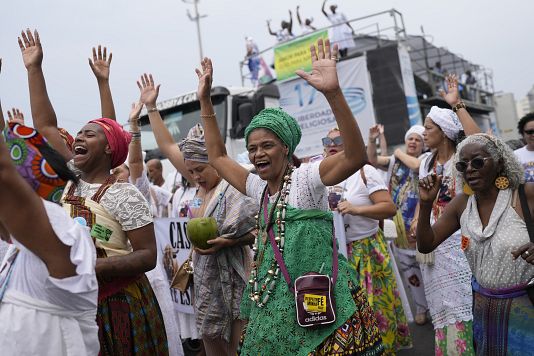Brazil
Practitioners from different religious groups marched on Sunday in Copacabana, Rio de Janeiro to urge for greater religious tolerance in Brazil.
Holding banners, dancing and performing traditional rituals, men, women and children marched and celebrated the vast religions and faiths that exist in the country.
They participated in the 17th edition of the Defense of Religious Freedom march.
The state of Rio is home to one quarter of the practitioners of Afro-Brazilian religions against whom a surge of intolerance has been reported.
“Everything that comes from black people, everything that comes from people of African origin is devalued, if we are not firm in our faith, we will lose strength, so this walk is to show that we are standing, that we will survive and we cannot stop,” Vania, a Candomblé practitioner said.
Christianity dominates Brazil's religious landscape.
While the Brazilian constitution protects the free exercise of religion, cases of disrespect and attacks have become frequent.
The attacks range from verbal abuse and discrimination to destruction of temples and forced expulsion from neighborhoods.
Jail term, fines
In the state of Rio, there’s been a proliferation of evangelical Christianity, particularly neo-Pentecostal churches founded since 1970 that focus on spreading their faith among non-believers.
Experts say that while most neo-Pentecostal proselytizing is peaceful, the spread of the faith has been accompanied by a surge of intolerance against traditional African-influenced religions ranging from verbal abuse and discrimination to destruction of temples and forced expulsion from neighborhoods.
Between 2018 and 2023, the Brazilian government's complaint service recorded an increase of 140.3% in the number of complaints of religious intolerance in the country.
In Brazil, those who commit crimes of religious intolerance can face up to five years in prison, as well as a fine.














01:00
Rare fresco of Jesus as Good Shepherd discovered in Turkish tomb
01:48
United States: Vermont school district receives threats after putting up Somali flag
00:14
Communities of slave descendants in Brazil demand recognition of territories and livelihood
01:45
Somalis criticise Trump's remarks calling them 'garbage' as racist
00:00
Pope Leo says he hopes to visit Africa in 2026 as he wraps up his first foreign trip
02:43
"Tamujuntu": where South Africa and Brazil meet in dance